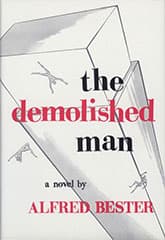The Demolished Man
Critique • Quotes
 First edition, 1953
First edition, 1953First publication
1952, serialized in Galaxy Science Fiction
First book publication
1953
Literature form
Novel
Genre
Science fiction
Writing language
English
Author's country
United States
Length
Approx. 91,000 words
The shape of science fiction to come
Anyone reading The Demolished Man for the first time today may enjoy it as a kind of typical science fiction thriller—a cat-and-mouse game between cop and criminal, set in the future. A Sleuth-style battle taking place in a future of rocket flight and humans who have developed powers of extra-sensory perception.
Very well done, cleverly plotted. Spiced up with a few typographical experiments, such as arranging words on the page to visually represent the shared thoughts of ESPers at a party, much like so-called concrete poetry.
All these interesting observations make Alfred Bester's first novel, well, interesting. Perhaps deserving of being, as it was, the first winner of the Hugo award for best novel from the World Science Fiction Society in 1953.
But these points wouldn't necessarily convey to the first-time reader why The Demolished Man is regarded by old-timers as so important to the science fiction field: namely, because it starts to move science fiction out of the scifi ghetto toward a merger with the modern mainstream of popular writing.
Which is not to say Bester goes all literary, like some other speculative fiction authors, looking to become respectable. Whole swatches of The Demolished Man still read like pulp fiction. The action is brisk, dialogue is breathless and the sentences are short. Characters still snap, growl and explode.
Beyond artiness
Yet the Grolier Multimedia Encyclopedia of Science Fiction called Bester's first two novels
the sf equivalent of the Jacobean revenge drama: both feature malcontent figures, outsiders from society bitterly cognizant of its corruption, but themselves partly ruined by it, just as in The Revenger's Tragedy or The Duchess of Malfi; like them, too, [Bester's] novels blaze with a sardonic imagery, mingling symbols of decay and new life—rebirth is a recurrent theme of [Bester's]—with a creative profligacy.
Can you imagine Isaac Asimov's or Robert Heinlein's work of that period being discussed in such terms? For there is a perceived depth in Bester's work that is signalled by his experimentation with grammar and typesetting but goes beyond artsy play to hint at psychological dimensions to his characters not found in prior science fiction.
Now, to be honest, The Demolished Man, in the character of the mind-reading cop Powell and more especially in the character of the ruthless, murderous business mogul Reich (a name to conjure with), offers rather simplistic pseudo-Freudian psychoanalysis. But the fast pace, the sardonic tone and the innovative narrative style tend to lend a surreal quality to the whole experience, as though it's all taking place in a hectic dream—resisting cool analysis.
Then when the psychological pieces fall together during the final plot twists with revelations that would be laughable in an afternoon soap opera, we feel we've settled back to sanity after a weird dream.
At which point, Bester gets in his moral of the story, which foretells a New Age of light and joy—as clearly a harbinger of the 1960s counterculture and Heinlein's similarly revered Stranger in a Strange Land (1961) as could be imagined.
Depending on how you feel about that later time and the direction of new-wave science fiction away from hard science and into the more literary mainstream of mysticism and perverse psychology, either The Demolished Man is a milestone or it has a lot to answer for.
But still, to come full circle, you can skip all that stuff about its place in SF history and enjoy it as one of the more clever—and most fun to read—novels of our era.
— Eric
Critique • Quotes

